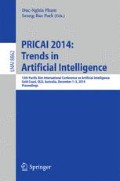Abstract
Continuously gathering data from wireless sensor network is one of crucial issue to be resolved. In the problem, there are multiple sensors to be transmitted, however, their data distributions are unknown at the starting point and to know such distributions we should try to gather data from them, and the resources to be used for it is also limited. The problem is often called Budget-Limited Multi-Armed Bandit problem, and several approaches have been proposed. However, often a wireless sensor network has a number of nodes to be retrieved so that it is difficult to try the all nodes to gather their potential possibilities because of very limited budgets, i.e., limited electricity power or limited bandwidth of the network. In this paper, we present an improved BLMAB algorithm that is more suitable for highly budget-constrained situation. The proposed approach can effectively limit sources to be retrieved when a relatively hard budget-limitation has applied. We conduct its experiments on a simulation environment to evaluate the potential performance of the approach.
Access this chapter
Tax calculation will be finalised at checkout
Purchases are for personal use only
Preview
Unable to display preview. Download preview PDF.
References
Stankovic, J.A.: Research challenges for wireless sensor networks. ACM SIGBED Review 1(2), 9–12 (2004)
He, T., Vicaire, P., Yan, T., Luo, L., Gu, L., Zhou, G., Stoleru, R., Cao, Q., Stankovic, J.A., Abdelzaher, T.: Achieving real-time target tracking using wireless sensor networks. In: Proceedings of the Twelfth IEEE Real-Time and Embedded Technology and Applications Symposium, pp. 37–48 (2006)
Simon, G., Ledeczi, A., Maroti, M.: Sensor network-based countersniper system. In: Proceedings of the Second International Conference on Embedded Networked Sensor Systems, pp. 1–12 (2004)
Boukerche, A.: Algorithms and Protocols for Wireless Sensor Networks. WileyBlackwell (2008) ISBN: 0471798134
Wagner, D., Wattenhofer, R. (eds.): Algorithms for Sensor and Ad Hoc Networks. LNCS, vol. 4621. Springer, Heidelberg (2007)
Akyildiz, I.F., Su, W., Sankarasubramaniam, Y., Cayirci, E.: Wireless sensor networks: A survey. Computer Networks 38, 393–422 (2002)
Tran-Thanh, L.: Budget-Limited Multi-Armed Bandits. University of Southampton, Faculty of Physical and Applied Science, Doctoral Thesis (2012)
Rogers, A., Corkill, D.D., Jennings, N.R.: Agent technologies for sensor networks. IEEE Intelligent Systems 24(2), 13–17 (2009)
Dekorsy, A., Fliege, J., Söllner, M.: Optimal distributed routing and power control decomposition for wireless networks. In: Proceedings of the Fiftieth IEEE Global Telecommunications Conference, pp. 4920–4924 (2007)
Kho, J., Tran-Thanh, L.L., Rogers, A., Jennings, N.R.: An agent-based distributed coordination mechanism for wireless visual sensor nodes using dynamic programming. The Computer Journal 53(8), 1277–1290 (2010)
Merrett, G.V.: Energy- and Information-Managed Wireless Sensor Networks: Modelling and Simulation. PhD thesis, University of Southampton, School of Electronics and Computer Science, Southampton, UK (2008)
Ok, C., Lee, S., Mitra, P., Kumara, S.: Distributed energy balanced routing for wireless sensor networks. Computers and Industrial Engineering 57, 125–135 (2009)
Romer, K., Mattern, F.: The design space of wireless sensor networks. IEEE Wireless Communications 11(6), 54–61 (2004)
Tran-Thanh, L., Rogers, A., Jennings, N.R.: Long-term information collection with energy harvesting wireless sensors: a multi-armed bandit based approach. Autonomous Agents and Multi-Agent Systems 25(2), 352–394 (2012)
Chong, C.-Y., Kumar, S.P.: Sensor networks: Evolution, opportunities and challenges. Proceedings of IEEE 91(8), 1247–1256 (2003)
Tran-Thanh, L., Chapman, A., de Cote, J.E.M., Rogers, A., Jennings, N.R.: Epsilon-First Policies for Budget-Limited Multi-Armed Bandits. In: Twenty-Fourth AAAI Conference on Artificial Intelligence, Atlanta, USA, Georgia, July 11-15, pp. 1211–1216 (2010)
Tran-Thanh, L., Chapman, A., Rogers, A., Jennings, N.R.: Knapsack based optimal policies for budget-limited multi-armed bandits. In: Twenty-Sixth AAAI Conference on Artificial Intelligence (AAAI 2012), Toronto, CA, July 22, pp. 1134–1140 (2012)
Auer, P., Cesa-Bianchi, N., Fischer, P.: Finite-time analysis of the multiarmed bandit problem. Machine Learning 47, 235–256 (2002)
Kellerer, H., Pferschy, U., Pisinger, D.: Knapsack Problems. Springer (2004)
Sano, Y., Kadono, Y., Fukuta, N.: A Performance Optimization Support Framework for GPU-based Traffic Simulations with Negotiating Agents. In: The 7th International Workshop on Agent-based Complex Automated Negotiations (ACAN 2014) (2014)
Sano, Y., Kadono, Y., Fukuta, N.: A Performance Optimization Support Framework for Multi Agent Simulations on Multi-core Environment. In: The 3rd IIAI International Conference on Advanced Applied Informatics (IIAI AAI 2014), pp. 475–480 (2014)
Audibert, J.-Y., Munos, R., Szepesvári, C.: Exploration-exploitation trade-off using variance estimates in multi-armed bandits. Theoretical Computer Science 410, 1876–1902 (2009)
Author information
Authors and Affiliations
Editor information
Editors and Affiliations
Rights and permissions
Copyright information
© 2014 Springer International Publishing Switzerland
About this paper
Cite this paper
Kadono, Y., Fukuta, N. (2014). LAKUBE: An Improved Multi-Armed Bandit Algorithm for Strongly Budget-Constrained Conditions on Collecting Large-Scale Sensor Network Data. In: Pham, DN., Park, SB. (eds) PRICAI 2014: Trends in Artificial Intelligence. PRICAI 2014. Lecture Notes in Computer Science(), vol 8862. Springer, Cham. https://doi.org/10.1007/978-3-319-13560-1_94
Download citation
DOI: https://doi.org/10.1007/978-3-319-13560-1_94
Publisher Name: Springer, Cham
Print ISBN: 978-3-319-13559-5
Online ISBN: 978-3-319-13560-1
eBook Packages: Computer ScienceComputer Science (R0)

